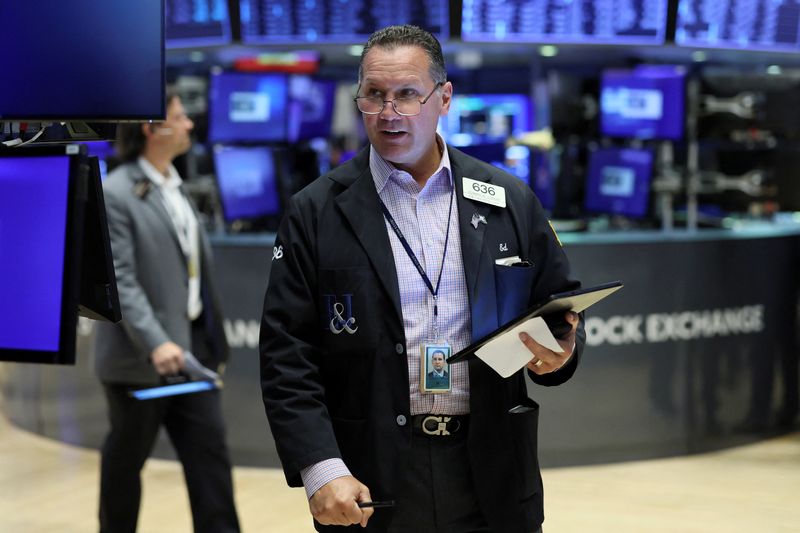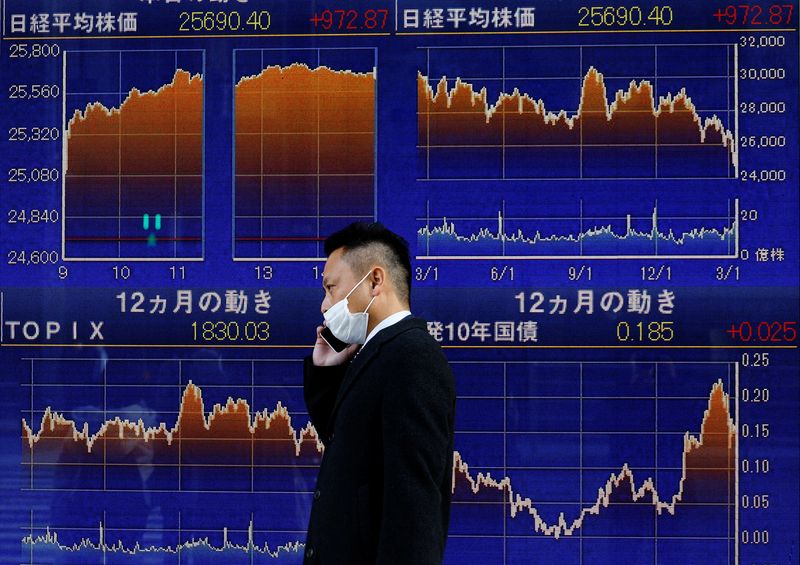By Caroline Valetkevitch
NEW YORK (Reuters) - Global stocks rallied on Friday, led by technology and growth shares, and interest-rate sensitive two-year U.S. Treasury yields hit more than 14-year highs as investors digested the view that more interest rate hikes are needed.
The dollar fell to a more than one-week low and the euro rose back above parity to a three-week high against the U.S. currency, a day after the European Central Bank raised rates by a record 75 basis points on Thursday signaleded further hikes to fight inflation.
On Wall Street, all three major indexes ended with gains of at least 1%, scoring their first weekly increase in four weeks.
"After three weeks of a temper tantrum, the market has finally come to terms with the expected 75-basis-point increase from the (Federal Reserve) this month," said Jake Dollarhide, chief executive officer of Longbow Asset Management in Tulsa, Oklahoma.
"People logically know we've got to change inflation, and that's being done... and rates are still incredibly low" historically, Dollarhide added.
U.S. rate futures are pricing in an 87% chance of the Fed hiking by 75 bps hike this month.
Fed Governor Christopher Waller said on Friday that the U.S. central bank should be aggressive with rate hikes while the economy "can take a punch." The comments came a day after Fed Chair Jerome Powell reconfirmed that the central bank's priority is to tackle soaring price pressures.
Investors await key U.S. inflation data for August due on Tuesday.
On Friday, the Dow Jones Industrial Average rose 377.19 points, or 1.19%, to 32,151.71 the S&P 500 gained 61.18 points, or 1.53%, to 4,067.36 and the Nasdaq Composite added 250.18 points, or 2.11%, to 12,112.31.
The pan-European STOXX 600 index rose 1.52% and MSCI's gauge of stocks across the globe gained 1.73%.
In Treasuries, the yield curve inverted further. The inversion is seen by some as a sign that a recession is likely in the next one to two years.
Two-year yields reached 3.575%, the highest since November 2007. Benchmark 10-year note yields were last 3.321%. They have risen from a four-month low of 2.516% on Aug. 2 but are holding below the 11-year high of 3.498% reached on June 14.
Earlier, Germany's two-year bond yield hit its highest since 2011 for a second day.
In currencies, the dollar index dropped as low as 108.35 and was last down 0.5% at 108.96, pulling back after recent sharp gains. The dollar index also posted its first weekly decline in four weeks.
"Markets are getting a little nervous about levels, really historic levels, so the market decided not to push the dollar's strength at this juncture and lightened up positions," said Greg Anderson, global head of FX strategy at BMO Capital Markets in New York.
The greenback this week jumped to a 24-year high against the yen, a 37-year peak versus sterling, with the dollar index surging to a more than 20-year high.
The euro leapt as much as 1.2% to a three-week high of $1.0114. It was last up 0.5% at $1.0045.
In other currencies, sterling was last trading at $1.1588, up 0.77% on the day.
The death of Queen Elizabeth on Thursday has heightened an uncertain state of affairs in Britain after the pound hit a 35-year low on the dollar earlier this week. [GBP/]
The Bank of England postponed its September interest rate decision for a week, to Sept. 22, following the queen's death.
Cryptocurrencies advanced as well, with bitcoin up 10.1% at $21,263.

Oil prices rose about 4%, supported by supply cut worries.
Brent crude rose $3.69, or 4.1%, to settle at $92.84 a barrel. U.S. West Texas Intermediate (WTI) crude rose $3.25, or 3.9% to settle at $86.79 a barrel.
